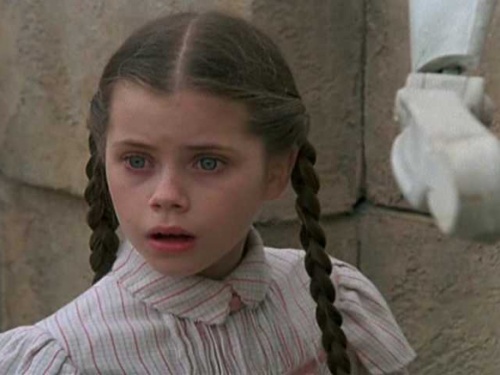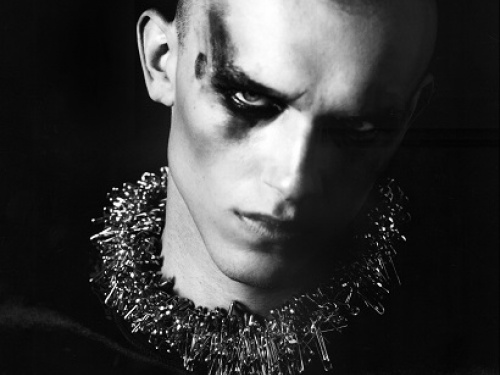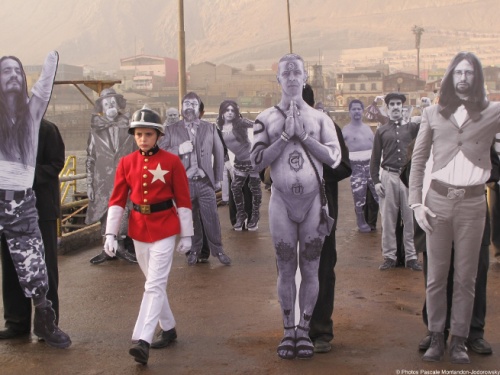Cannes Film Festival: Our Top Ten
Cinema and Film Programme Manager Nico Marzano picks ten unmissable films from Cannes Film Festival.
After watching 35 films in seven-and-a-half days at Cannes Film Festival, it's time to reflect and try to make sense of this triumph of images, sound, light, emotion - and everything else that cinema means to us.
For this #Cannes2016 round up, I have selected my ten favourite films from the festival:
1) The Student by Kirill Serebrennikov
This was the best film I saw in Cannes: refreshingly original, formally bold and with a director in total control of a narrative arc that touches on many contemporary issues in Russia. Based on a play by Marius von Mayenburg, Kirill Serebrennikov's film creates theatre within cinema. The story of many conflicts, it mainly focuses on Venya, a Christian student who decides to confront his atheist biology teacher Elena by constantly quoting the Bible. Serebrennikov is able to deliver drama and comedy not just within the same scene but within the same frame, using cinematic language with incredible confidence. There are hints of Zvyagintsev in his formal choices, however he is certainly a director to watch out for in years to come.
2) Aquarius by Kleber Mendonça Filho
Divine, magnetic Sonia Braga plays the main character in this incredible film. The second fiction film by Brazilian director Mendonça following his acclaimed debut Neighbouring Sounds, Aquarius is both a case study of Brazilian society and a portrait of a woman who is not afraid of embracing her sexuality. It is not only a film about Brazil and its unscrupulous property developers but also a warm portrait of family dynamics with one woman leading them and charming us all: Sonia Braga's outstanding Clara.
3) Toni Erdmann by Maren Ade
Tipped by many as the likely Palme d'Or winner, Maren Ade's latest work (her third feature) is the story of a father, Winfried, who is concerned with rebuilding a connection with his daughter, Ines. He decides to visit her and adopts the role of the prankster in order to make her rediscover the most important values in life (and not only those connected to her career) while trying to finally regain a proper father-daughter relationship. Toni Erdmann feels like Bunuel meets Kaurismaki with some excellent moments in the script. The only disappointing element for me was the fact that at the very end, the director decides not to trust her audience and feels the need to explain the film to us. It reminded me of the feeling I had while watching Il Divo by Paolo Sorrentino...but I won't go into any more detail as we all hate spoilers!
4) Risk by Laura Poitras
Risk is the latest effort by great documentarian, artist and investigative journalist Laura Poitras - an empathetic portrait of Julian Assange and his WikiLeaks team. Clearly the film needed to work within legal constraints of what could be shown and discussed and this may have affected the final cut. Nonetheless Risk is a very strong, fly-on-the-wall documentary that keeps us all aware how much still needs to be done in order to support the political struggle against government surveillance. One hilarious break point in the film's structure is a visit that Lady Gaga pays to Assange in the Ecuadorian embassy where he has spent the last four years of his life and where he continues to stay with no resolution in sight. After screening Citizenfour for 30 consecutive weeks last year, the ICA will be delighted to support Laura's new work.
5) Paterson by Jim Jarmusch
Jim Jarmusch latest film is a sweetly contained, at times silly, beautiful film. Paterson (Adam Driver) is a bus driver who lives in Paterson, which is also the name of his last bus stop. It is a film about poetry and the little things in life that make us reflect and help us join the dots. It's a film about the value of understatement in a society obsessed with overstatement. Jarmusch turns life's small daily accidents into poems in such an effortless way that it feels almost impossible not to surrender. His minimalist cinema is finally back.
6) Neruda by Pablo Larraín
Neruda by Pablo Larraín plays with the biopic genre in a refreshingly skillful and poetic way. For Larrain aficionados, it's important to note that this work represents a total departure from what we are used to seeing from this gifted Chilean director. While Gael García Bernal ticks all the boxes without impressing too much, main actor Luis Gnecco delivers a lifetime performance. This is a new direction for maestro Larraín, yet nonetheless builds on his previous masterpieces such as Tony Manero or more recently The Club.
7) My Life As A Courgette by Claude Barras
As legendary sound designer and film editor Walter Murch highlighted during his latest event at the ICA, the most exciting developments in cinema seem to be coming from animation and documentary. My Life As A Courgette beautifully, and with a deep degree of sadness, supports this. The film is a dark, delicate tale of a bunch of kids living in an orphanage that becomes their family until they have the chance to join a new one. To add to the emotionally-charged atmosphere of the film, a rearranged soundtrack piece Le Vent Nous Portera by Noir Desir ultimately pushes you over the edge.
8) The Long Night of Francisco Sanctis by Andrea Testa, Francisco Marquez
The Long Night of Francisco Sanctis, in competition for the Un Certain Regard category, is a nocturnal, paranoid journey into a period of Argentinian history marked by dictatorship. South America was greatly affected by the events of the 1970s and early 80s and, while this work gives us few facts about what was going on during those years, it perfectly evokes the feelings of those targeted by the military. The film is also extremely well shot. Let's hope it finds UK distribution - Argentinian history should not be forgotten.
9) The Charro of Toluquilla by José Villalobos Romero
Mexican documentary is living through an exceptional moment. El Charro de Toluquilla is a film about a mariachi singer called Jaime-Garcia Dominquez. We watch Jaime and his family as he follows his dreams as well as witnessing his everyday ups and downs, while coping with one big issue: Jaime has HIV. The final scene of this documentary is one of the most poetic, striking endings I have seen in cinema in recent years.
10) The Lives of Thérèse by Sebastien Lifshitz
In The Lives of Thérèse, director Sebastien Lifshitz creates an extremely tender account of France during the 1960s from the point of view of a dying French feminist activist: Therese Clerc. In the turbulent late 1960s, Therese decided to divorce after 20 years marriage and embrace a series of political struggles. She now faces the last days of her life while talking about women's rights, sexuality and family. The Lives of Thérèse emanates hope and energy despite the gloomy imminent end. For a release in UK cinemas this feature documentary presents only a small issue: the length. It's only 52 minutes long.
Special mention: Endless Poetry by Alejandro Jodorowsky
The great Alejandro Jodorowski can't be contained in any category, top ten or classification. He is pure oxygen for the soul. Endless Poetry (Poesia Sin Fin) is the companion piece to his previous work The Dance of Reality and supposedly the second part of a five-work collection (three still to come!) that acts as a cinematic memoir of the whole Jodorowsky family and his life as filmmaker, poet, tarot reader, philosopher and life enthusiast. Echoes of Fellini coat the whole film without descending into mere senseless homage. It's a film with a big heart and, as per its title, filled with endless poetry.
"Your brain will ask you lots of questions. Your heart will find the answers. You ask me what's the meaning of life? There is no meaning. You just need to live. Live! Live!" Alejandro Jodorowsky ■
Help us improve the ICA Blog!
We're keen to improve the appearance of the ICA Blog and we want to hear from you! Just fill in this quick survey - you'll even be in with the chance of winning some great prizes.
This article is posted in: Articles, Blog, Events, Film
Tagged with: Film, Films, Cannes Film Festival, Nico Marzano, Film Director, Directors, Pablo Larrain, Alejandro Jodorowsky, Kirill Serebrennikov, Kleber Mendonça Filho, Maren Ade, Laura Poitras, Jim Jarmusch, Claude Barras, Francisco Marquez, Andrea Testa, José Villalobos Romero, Sebastien Lifshitz










